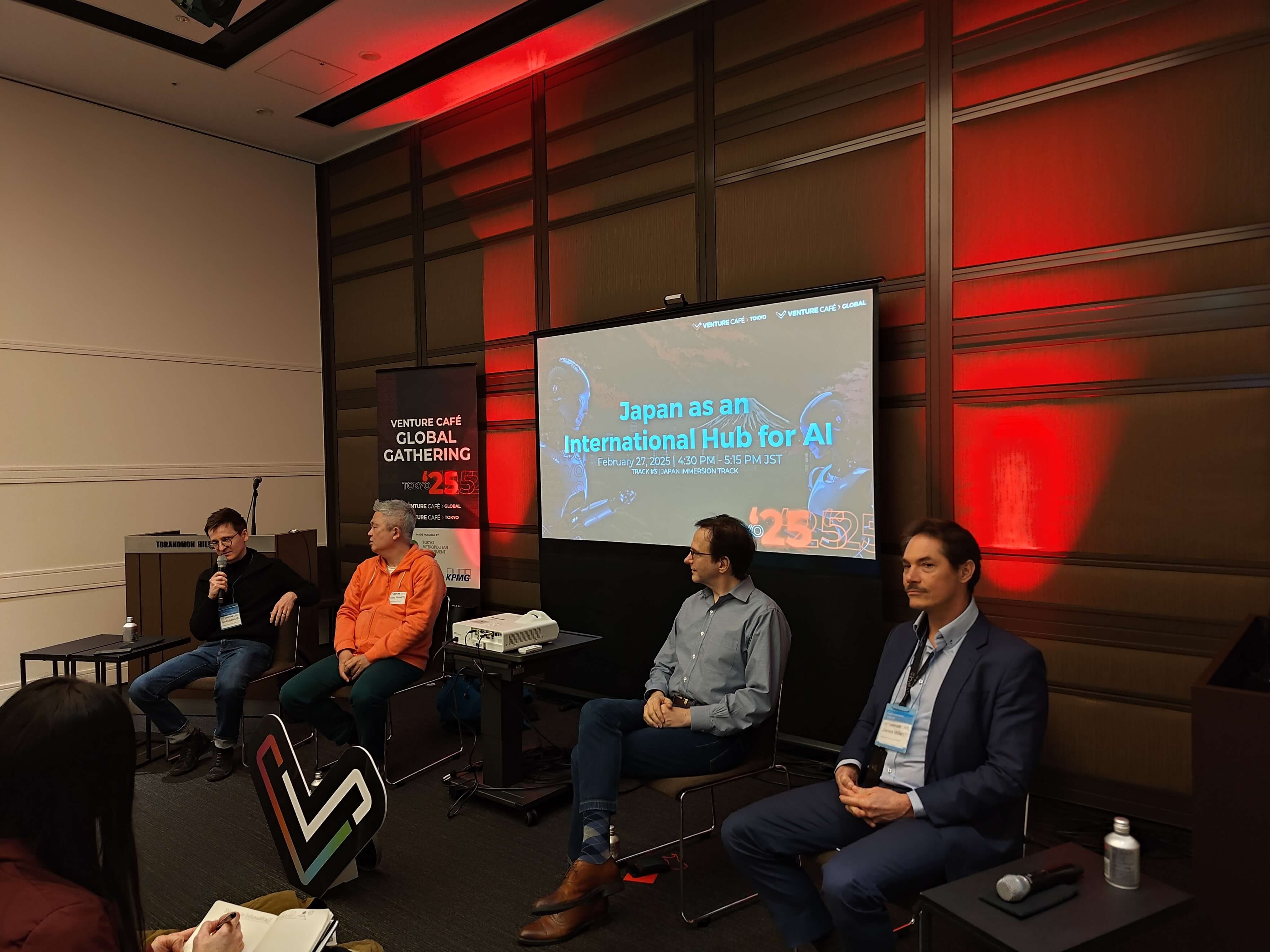Japan As An International Hub for AI: What’s Holding Us Back?
Venture Café Global Gathering
Have you heard of Venture Café before? I have not, but I saw they were having a "Global Gathering" event in Tokyo on February 27 at Toranomon Forum, and a few people I knew (like Tim Romero and Terrie Lloyd) were going to speak so I signed up.

Japan As An International Hub For AI Panel
Japan has always been a powerhouse in technology. From pioneering early neural network research to pushing the boundaries of mobile innovation, the country has had its fair share of breakthroughs. And yet, despite all this, Japan isn’t quite at the forefront of AI commercialization the way the U.S. and China are.
That was the theme of the panel discussion that I managed to catch, and since we're doing AI it's something I'm interested to know more about. The panelists were:
- Ilya Kulyatin - Founder, AI Foundry
- Ryota Kanai - CEO, Araya Inc.
- Tim Romero - Partner, JERA Ventures
- James Miller - Director, Japan Institute for CyperSpace Studies
These panel of experts, spanning AI researchers, entrepreneurs, and policymakers sat down to discuss Japan’s AI landscape. What’s working? What’s missing? And most importantly, how does Japan position itself as a true global AI hub?
Further Reading
If you're interested in this subject, I have also previously written the posts below which might also interest you:
- Competing in the Realm of AI: Japan's Imperative
- NII’s Game-Changing Japanese LLM: llm-jp-3-172b-instruct3
Key Takeaways
1. A Strong Research Legacy—But Where’s the Product?
Japan was among the earliest players in AI research, contributing significantly to neural networks and robotics. But while Japan excels in theoretical advancements, there’s a gap in translating these innovations into market-ready AI solutions. Many groundbreaking ideas remain stuck in research labs instead of making their way into real-world applications. Sound familiar? This has been a recurring theme in Japan’s tech industry for years.
2. Data Infrastructure: A Hidden Goldmine
Japanese corporations sit on a treasure trove of industrial and manufacturing data—arguably among the most valuable datasets for AI-driven automation. However, much of this data remains siloed within corporate walls, largely inaccessible to startups and researchers who could leverage it for innovation. Recent efforts, like the Moonshot R&D program, aim to break these silos, but there’s still a long way to go in fostering real collaboration across academia, industry, and government.
3. Policy: Japan’s “Third Way” Approach
When it comes to AI governance, Japan is carving its own path—somewhere between the heavily commercial U.S. model and the strict regulatory stance of the EU. Japan’s policy focus is on risk-based assessments, ethical AI, and privacy, ensuring technology aligns with human-centric values. While this approach prioritizes safety, it could also slow down innovation if not implemented with flexibility.
4. Startups & Investments: The Need for Full-Time Founders
AI entrepreneurship in Japan is growing, but there’s a persistent challenge—many AI startups are led by part-time founders, often researchers who split their time between academia and business. This lack of full-time leadership hinders rapid scaling. The investment scene, however, is showing promise: venture funds are growing larger, allowing startups to delay IPOs and focus on long-term development.
5. Bridging Research and the Market
One of the boldest ideas discussed at the panel was the need for more academic spin-outs—professors and researchers taking the leap into full-time entrepreneurship. Japan has set ambitious AI goals, like brain–computer interfaces by 2050, but to make these a reality, there needs to be a stronger pipeline that turns research into scalable products. Without it, even the most ambitious targets risk becoming just another white paper.
What’s Next for Japan?
-
Leverage Japan-Specific Data Japan has a unique industrial base and an aging population—two factors that generate incredibly valuable datasets for AI training. Unlocking this data could be a game-changer.
-
Foster More Collaboration We need more bridges between corporate R&D labs, universities, and startups. Programs that facilitate joint development efforts could help accelerate commercialization.
-
Support Startup Growth with Patient Capital Unlike the Silicon Valley “move fast and break things” approach, Japan can carve out a different model—one that prioritizes sustainable, long-term AI development.
The panel ended with a challenge to Japan’s AI community: How can we break down barriers, create networks, and ensure Japanese AI innovations don’t just stay in the lab, but make their mark on the global stage?
If Japan can get these pieces right, there’s no reason why it can’t become a dominant force in AI. The potential is there—the real question is whether Japan can execute.